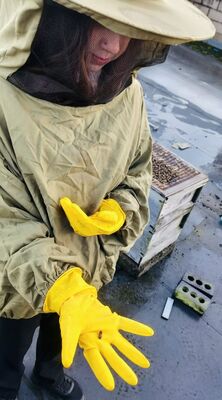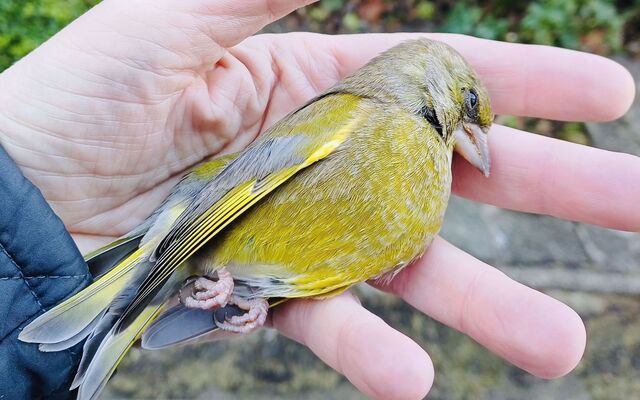WHILE most of us were fast asleep in our beds last Saturday, a small dedicated band of nature activists were working through the night on the Belfast Hills.
As part of a 24-hour ‘Bioblitz’ on the former landfill site at Mullaghglass, they were trying to find and classify as much nature as possible in a single day – and that included working through the night trapping bugs and moths as well as using night sights and sonic equipment to see owls and other nocturnal wildlife.
The Bioblitz was the brainchild of animal lover Debbie ‘Dr Doolittle’ Nelson, who has devoted her life to single-handedly saving birds and animals in need.
“The Bioblitz helps us produce a species list for Mullaghglass Wetlands Project right at the beginning, as it returns to what it used to be,” she said. “We’re rewilding the site and this is a good time to watch nature coming back in. In the years to come, having a species list will allow us to see accurately how it develops.”
When Dúlra arrived for the start of the Bioblitz at 5pm on Friday, the old landfill site was a hive of activity. Young people were being sent out to various parts along with experts to spot and classify birds or dragonflies, fungi, bugs and even lichens. The project got the full support of the landfill owners, the Breedon Group, who had set up a project HQ which included a food van supplying burgers and chips. And it was returning at 9am next morning to give all the volunteers fry-up breakfasts!
The Bioblitz involved inviting scientists in a wide variety of fields on to the 100-acre site to accurately identify all the wildlife there.
“We’re not experts,” said Debbie, although Dúlra can hardly imagine people more knowledgeable about wildlife than Debbie and her colleagues, Bog Meadows champion Aidan Crean and the Black Mountain’s Aaron Kelly, who were all taking part. We would come across plants, bugs, insects and we don’t know what they are,” added Debbie. “I thought we needed a Bioblitz here and get people who are good in their field to help us produce a species list for the site.”
Debbie handles with care
Debbie said it wasn’t hard to attract all those experts from places like Queen’s University and the Ulster Museum.
“When you’re going to a site that you’ve never been to before, and it hasn’t been studied, you might just find something new. It’s a trainspotter thing,” she said. “You might find a plant you’ve never seen before, and it’s in here, a place you couldn’t visit only for this event. That’s hard to resist!”
The special thing about Mullaghglass – which won an Aisling Award last year – is that it’s not open to the public, and it’s going to stay like that, with just school groups or experts invited in.
“Nature has retreated here because there is so much disturbance everywhere else,” said Debbie.
“We’re watching the rewilding taking place in real time. When the pond was put in, in no time we had eight species of dragonflies and damselflies.”
Debbie and Aidan have been touring Breedon’s 16 quarry sites across Ireland carrying out bird surveys.
“Because the public aren’t allowed in, we’ve found phenomenal wildlife," she says. “It’s not greenwashing, Breedon are not doing it because they have to, they are doing it because they want to. We love working with them.”
Although there were scores of volunteers for the start of the Bioblitz, that number would fall overnight. “It’s about health and safety of course,” said Debbie. “We have to be very careful here at night but we have our tents up – although we’ll not be getting much sleep because there’s so much to do all through the night.”
One of those on hand to help was Emer Morrison (27), whose introduction into the world of environmentalism was certainly unique.
As an 18-year-old she was walking through the Bog Meadows early one morning when she saw birds trapped in a giant mist net. And so she did what any other nature lover would do – set about freeing them.
Aidan and Emer
“I got them all out except one robin,” she told Dúlra at the Bioblitz.
“It was all tangled so I took the whole net home and finally got it out and it was flying about my kitchen in St James’s.
“I rang my da Kevin and told him what what had happened. And he said, ‘Oh, Emer, what have you done?’ He said it wasn’t bad people trapping birds but Aidan Crean’s Bog Meadows group! He said he’d ring him and explain, and a short while later a woman called to get the net back.
“I was scundered – it was a shameful handover at the front door. It was a brand new net worth 200 or 250 quid and it was the first time it was up, and I had shredded it.
“I thought I was a warrior saving these birds, but I never knew anything about the Bog Meadows bird ringing. It was a learning curve.”
Some time after that Emer decided to take young daughter Mia to the Bog Meadows where Chris Packham was hosting a nature event. “Aidan Crean was there and he had a blackcap in his hand – and he let Mia hold it,” Emer said. “To think a blackcap was the first bird she had ever handled!”
Emer knew then what she wanted to do – work with nature. “From I was no age I was into nature, always coming in with pigeons with broken wings and trying to catch mice,” she said.
And so she did a course in animal care and welfare at Belfast Met and started a traineeship with Ulster Wildlife. That course included a placement and Emer knew immediately where – the Bog Meadows.
“I signed up to the Belfast Ringing Group, with Aidan as my trainer. So I went from pulling his net down to him teaching me how to put them up properly. He was so supportive and patient and really brought me along. He loves to see young people doing good – he’s always saying that the next generation are going to fix everything the previous generations have damaged.”
Emer’s bird-ringing journey required massive commitment. She spent three years getting her C Permit, which involved ringing 750 birds of 40 species. She’s now got her sights set on an A Permit, which requires another 750 birds and 10 more species. So far she’s got 48 species – “all the most common ones” – and if she makes it, this time under Debbie’s coaching, she will become a trainer herself and be able to take trainees under her wing.
“It’s not easy,” Emer admitted. “You’re often getting up at four o’clock in the morning, spending weekends down in Mayo trapping birds and this year it involved a weekend in Donegal. And you have to do nighttime and coastal ringing – you’re always learning.
“I’ve ringed herons, little auks, even a peregrine falcon near Ballymena. It’s such an amazing bird to hold in your hand. Gulls can be vicious and of course you have to be careful with birds of prey. I’ve been bitten by all sorts, but the worst bird is the tiny blue tit – they nip you and always draw blood!”
Mum-of-two Emer also studied to be a joiner, and those skills are always in demand at Mullaghglass where she’s helped build owl boxes which have been scattered around the site.
Meanwhile, Debbie can never be off-duty at this time of the year, with so many animal emergencies. She answered her phone while Dúlra was talking to her – “Yes, of course I can take it,” she told the caller. And moments later a baby wood pigeon was handed over to her at the gate of Mullaghglass – it had been found in Lisburn when its nest fell.
“I’ll feed it with a syringe for a couple of weeks before freeing it,” she said. “It’ll keep me company in the tent overnight!”
• If you’ve seen or photographed anything interesting, or have any nature questions, you can text Dúlra on 07801 414804.






